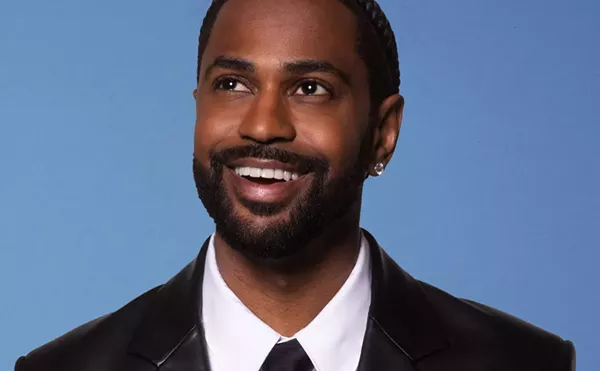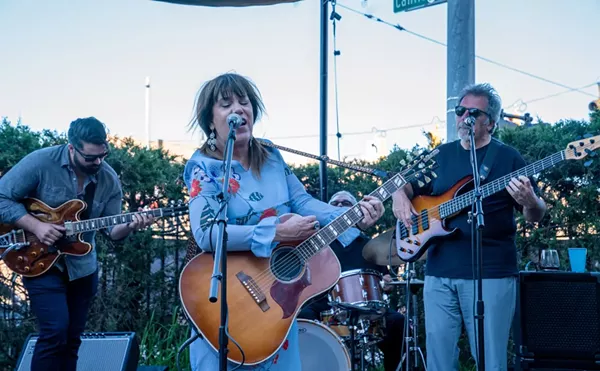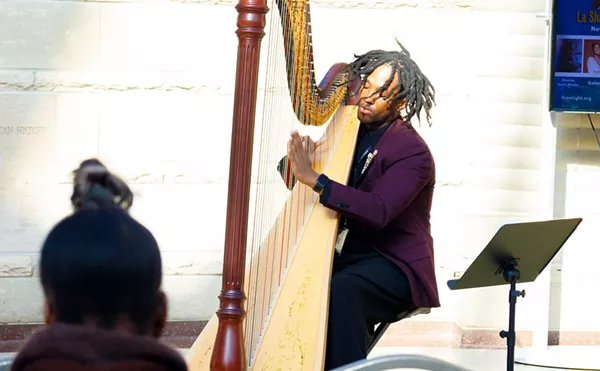
Audio By Carbonatix
[
{
"name": "GPT - Leaderboard - Inline - Content",
"component": "35519556",
"insertPoint": "5th",
"startingPoint": "3",
"requiredCountToDisplay": "3",
"maxInsertions": 100,
"adList": [
{
"adPreset": "LeaderboardInline"
}
]
}
]
If you give a thousand 5-year-olds a thousand mandolins, one of those kids is bound to become a legend of country music.
It happened to Ricky Skaggs. Before most of his peers had matriculated from “Romper Room,” Skaggs had a lifetime’s worth of performance credentials under his belt. By the time he hit puberty he had jammed with pre-eminent bluegrass inventor Bill Monroe, played a popular TV show hosted by country chart-toppers Flatt and Scruggs (best known for “The Ballad of Jed Clampett”) and was a permanent member of the legendary Ralph Stanley’s band.
“Before I was a teenager I had witnessed three events that set the course for my life,” Skaggs admits. “I didn’t think about it much as an 8-year-old because I had been blessed by growing up around my heroes, but I think about it that way now. The first was on stage with Bill Monroe when he took off his mandolin, wrapped his bootstrap around it so it would fit me, and let me play his mandolin.”
In the eyes of bluegrass fans, there was probably never a more symbolic passing of the torch than that night in the winter of 1959. Bill Monroe, a man unanimously credited with creating one of this country’s most distinct musical art forms, handed over his instrument to the 6-year-old Skaggs, who proceeded to bring the house down with his rendition of “Ruby, Are You Mad At Your Man?”
The other two events that dramatically affected Skaggs were equally astonishing. The first was the night he met Lester Flatt and Earl Scruggs, which according to Skaggs “meant more than meeting the Beatles or the Rolling Stones.” Another event that shaped Skaggs’ destiny happened when he performed at Ernest Tubb’s landmark record shop in Nashville and a young Loretta Lynn (who was a relative unknown and had not yet become a part of the Grand Ole Opry) walked through the door. Even today, he speaks of these seminal moments in his childhood with reverence.
“I had grown up with the classics — Bill Monroe, Flatt and Scruggs and Ralph Stanley,” Skaggs says. “I had met or performed with all three of them by the time I was 9. I was ruined after that. Those guys’ effect on me was so strong and so deep that my music really took root in those early days. I still believe that Bill Monroe was the most important and influential person to ever walk through the gates of Nashville. There was never a voice like his then and there never will be.”
Skaggs says Monroe was the first triple threat (“a great singer, songwriter and player”) to come to Nashville, even before Hank Williams.
“As much as I’ve always loved Hank, and I realize his contribution to country music, he just can’t compare to Bill Monroe. Bill Monroe took a little small mandolin and used it like a weapon and sang in this voice that was so beautiful it just got in your bones if you heard it. Even on the way to creating bluegrass he stumbled onto what would become rock ’n’ roll — Elvis, Carl Perkins, Buddy Holly all were influenced by him. Elvis’ first real hit was ‘Blue Moon of Kentucky.’ Without him rock ’n’ roll wouldn’t be the same and bluegrass and rockabilly probably would never exist.”
Using Monroe as a model, Skaggs himself became a virtuoso — mastering mandolin, guitar and violin. After a three-year stint with Ralph Stanley’s band (which Skaggs joined when he was only 15) he landed a permanent position backing up Emmylou Harris in her Hot Band. Following the Harris gig, Skaggs moved to Nashville and hit pay dirt. He signed a major-label deal with Epic and dived headfirst into the U.S. heartland in 1981 when his debut, Waiting for the Sun to Shine, boasted two No. 1 hits on the country charts.
“It seemed like I just kept getting good breaks,” Skaggs humbly admits.
That’s an understatement. In the early ’80s Skaggs was country, cranking out one hit after another and introducing a much-needed traditionalist element to the bloated and overproduced Nashville scene. The decade saw him win eight Country Music Association Awards and four Grammys. His influence opened the door for artists like Dwight Yoakam and Vince Gill.
His popularity landed him a TNN show called “Monday Night Concerts” that saw Skaggs carry on the tradition of his childhood luminaries. He brought together young and old musicians from various genres.
“We had everybody on that show — George Jones, Carl Perkins, Elvis Costello, Don Gibson, Gene Watson, Don Henley … and it was so cool,” he says. “Our intent was to honor the past while nurturing the future — letting people like Mark Chesnutt play with his hero Ray Price. Elvis Costello finally got to play and sing with George Jones — something that he told me was the coolest thing that had ever happened to him.”
Eventually Skaggs’ honeymoon with Nashville began to sour. The pressures of having to cough up hit songs started to build up; his insecurities welled.
“I found myself thinking, ‘I wonder if Kenny Rogers is gonna get me this week.’ I’d catch myself wondering if George Strait or Dolly was going to take over my No. 1.”
By the mid-’90s, the face of country was changing. The unbelievable popularity of the genre had made a difference in the character of the music itself. Country became a glossy force in pop culture and begot bright young things like Shania Twain.
“In ’96 I saw the writing on the wall for me and my involvement with country. I had been there and tried to do what I felt was right and I had a good go at it. But, I was not CMT [Country Music Television] friendly. I was not ‘new’ country. I felt a shift in the music and the wind was blowing in another direction. Mr. Monroe passed away and so did my father. And with that there was just a feeling that country music had passed away. The people we grew up loving — like George Jones and Merle Haggard and Buck Owens — couldn’t even get record deals.”
Just as Skaggs’ performance with Bill Monroe had affected him as a child, it also altered his own career as an adult.
“When Mr. Monroe was very ill, we hoped and prayed that he would come back to the Opry,” Skaggs says. “After he passed I realized that when the king is absent he leaves a void. There was a place that I needed to take. I needed to take my place in bluegrass and focus on it. We left Atlanta and a thriving country music career because I needed to simplify my life and do something that I believed in.”
For Skaggs the move couldn’t have been better timed. With the first bluegrass record he made — one issued on his own Skaggs Family Records — he won three Grammys. A national resurgence in bluegrass music was about to be introduced by the multiplatinum sound track to O Brother, Where Art Thou? And much like the ’80s, Skaggs seemed to intuitively be in the right place at the right time.
During the last five years, Skaggs has remained on the forefront of the bluegrass revolution, and his band, Kentucky Thunder, has successfully released a number of award-winning records. The latest, Ricky Skaggs and Kentucky Thunder — Live at the Charleston Music Hall, is built on spirited traditional bluegrass numbers (including Monroe gems like “Why Did You Wander” and “Uncle Pen”), Skaggs’ own breathtaking songs (“A Simple Life”) and thoughtful covers (Harry Chapin’s “Cat’s in the Cradle”). An amazing testament to the band’s live performances, the record features impeccable vocal harmonies and jaw-dropping instrumental mastery. In the end, … Live at the Charleston Music Hall, offers a snapshot of Skaggs at what could be the finest moment in his long career as an emotionally vibrant example of the contemporary relevance of bluegrass music.
“I knew that we were in the right place and had done the right thing by playing an honorable music,” Skaggs says, “and I knew if I was honest with myself, I could go to another level as a musician and a songwriter. Between me and my band it is a constant exchange of gratefulness for what we can provide for each other and the power of the music we are playing.”
Ricky Skaggs and Kentucky Thunder will perform Saturday, May 17, 7 p.m. in Hart Plaza as a part of the 2003 Budweiser Hoedown. The three-day festival will include performances by Trace Atkins, Diamond Rio and Patty Loveless. Call 313-877-8077 for information.
Nate Cavalieri writes about music for Metro Times. E-mail him at letters@metrotimes.com




